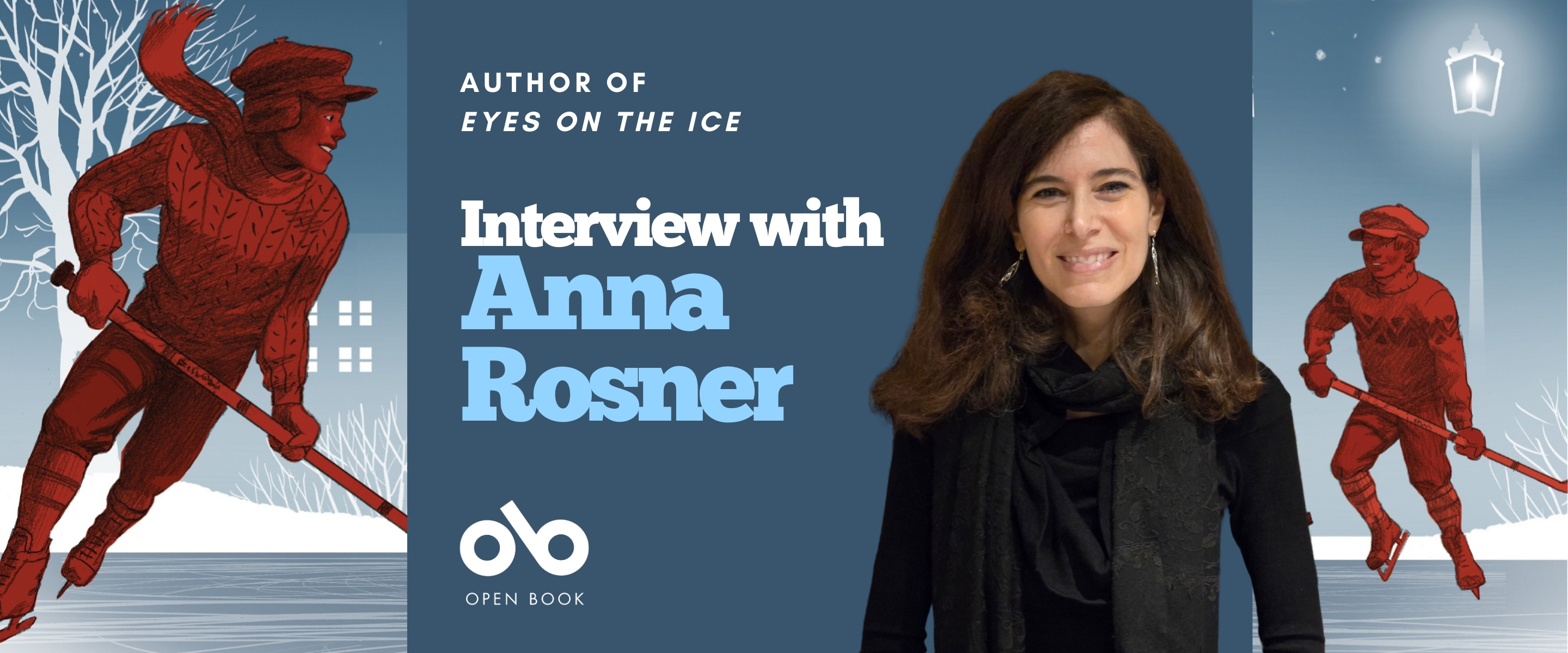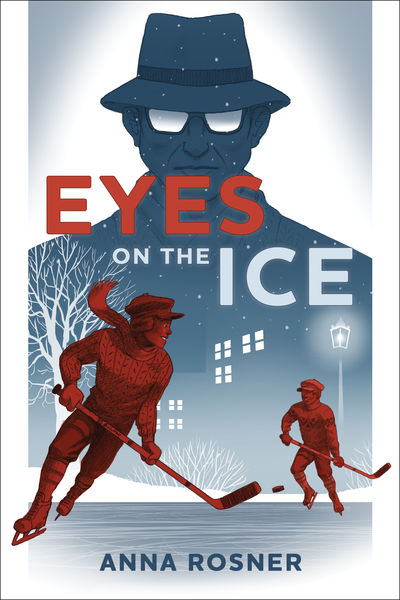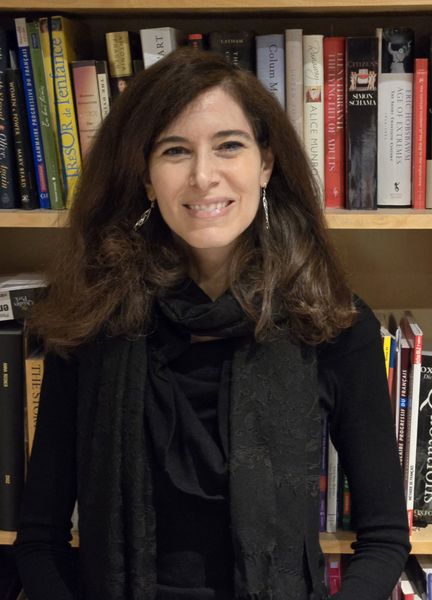Two Young Athletes Find Themselves Torn Between the Sport They Love and State Rule in Eyes on the Ice
Already the author of two critically acclaimed hockey biographies for young readers, Anna Rosner has stayed with the sport, but shifted approaches and forms in her latest work.
The result is the powerful middle-grade novel, Eyes on the Ice (Groundwood Books), a story about Ten-year-old Lukas and his brother Denys. All they want to do is play hockey, but living in Czechoslovakia in 1963, they are constantly under the watchful "Eye" of the state, which extends to surveillance of the sport and any dissenting views that might come from citizens and would-be athletes like Lukas and Denys.
As they advance as hockey players, the stakes and tensions are ratcheted up to to a breaking point, and the boys are forced to make harrowing decisions at the risk of their family and friends. It's a riveting look into a key passage of childhood against the backdrop of Soviet Communism and state rule.
We have a fascinating Kid's Club BFYP interview with the author to share with our readers today, where Rosner talks about the origin of the story, and how she came to care for these characters as if they were part of her family.
Open Book:
Tell us about your new book and how it came to be.
Anna Rosner:
Eyes on the Ice is a middle grade novel that takes place in Czechoslovakia in the 1960s. Ten-year-old Lukas and his brothers live under the Soviets’ oppressive Communist regime, but they find joy and freedom at the local hockey rink. When their father is imprisoned for crimes against the state, the boys must sacrifice all that they love to save him.
There were numerous inspirations for Eyes on the Ice. First and foremost, I am a hockey fan (Leafs, of course! And the Oilers aren’t so bad). More importantly, I think there’s a real need to make difficult history accessible to young readers, and sport is an effective lens to help us do that. Communism, with all its tentacles, resulted in the deaths of tens of millions of people, but those born after 1989 are often unfamiliar with these tragedies. As I mentioned in an author’s note at the end of the book, Russia’s 2022 invasion of Ukraine is connected to the collapse of the USSR. Putin longs to reunify these former Soviet states. I wanted young readers to have some understanding of Communism and of the links between past and present, because when those links are severed, our understanding of the world becomes limited.
OB:
Did the book look the same in the end as you originally envisioned it when you started working, or did it change through the writing process?
AR:
Since it was a long, eight-year process, and I wasn’t entirely sure how to write a middle-grade novel yet, the book took on many forms. At first, the protagonist grew up to be twenty, and the story ended with an exciting high-speed chase and defection. I sent that version to a publisher and the editor was kind enough to write me a fairly detailed email in response. I understood that the children had to stay young, and that I was too focused on the politics of the era. But these changes required cutting more than half the book, and I just didn’t have the heart. So I abandoned the project for almost five years. During that time I published two biographies for young readers and that helped me better understand the need to respect the child’s voice. With encouragement from a fellow author, I finally located the manuscript in the depths of my hard drive, made the colossal cuts from the story, and started again. This time, Lukas and Denys are ten and twelve, and they stay that way.
Your CanLit News
Subscribe to Open Book’s newsletter to get local book events, literary content, writing tips, and more in your inbox
OB:
What was the strangest or most memorable moment or experience during the writing process for you?
AR:
What was surprising but also touching was my relationship to Lukas and Denys. I didn’t expect to love my fictional family as much as I did. I thought about them constantly. I dreamed about them. When Lukas cried in the story, I cried with him, and then I would catch myself and wonder if I had gone off the deep end. But I think most writers do that. We become entirely immersed in our stories and can’t separate ourselves from the characters we’ve created. They become our families during the years we spend with them. And when it’s time to let go, it isn’t easy. When the final draft of Eyes was accepted at Groundwood and my wonderful editor said okay, that’s a wrap, I felt a little lost. C. S. Lewis famously said, “We read to know we are not alone,” but we also write to know we’re not alone.
OB:
How do you cope with setbacks or tough points during the writing process? Do you have any strategies that are your go-to responses to difficult points in the process?
AR:
I love writing so much that I don’t mind the tough days. It’s a privilege to have your work published and I feel grateful to be able to share the stories I want to tell. I don’t mind saying that I failed miserably at first; fifteen years ago I wrote silly picture books and didn’t have the experience necessary to understand that they were silly. But a wise author told me that if our work isn’t rejected far more than it’s accepted, we’re just not sending out our manuscripts enough. I also loved Stephen Marche’s essay, On Writing and Failure, and would suggest it to every author. Failure is a part of writing and I have (almost!) gotten used to it.
One strategy that helps me overcome a difficult stage is to completely leave the manuscript alone for at least three days, and then go back to it. Fresh eyes are the best editors. I also send some troublesome passages to my parents. They are bookworms, and they won’t hesitate to tell me if something isn’t working.
OB:
What are you working on now?
AR:
Currently I am editing a middle grade, graphic, non-fiction text about Richard (Ryszard) Spira, a young pianist who was imprisoned in the Warsaw ghetto in 1940. Music was very prevalent in the ghetto; it was an act of resistance and hope, and for some, a source of survival if they played in the street. There were quartets, marching bands, and a wonderful symphony orchestra. Richard played Beethoven’s Emperor Concerto at the orchestra’s opening concert in November of 1940. It’s a difficult text for me to write, but it focuses on the joy of music and Richard’s relationship to his Christian teacher, who was living on the “Aryan” side of the wall. I’ve also integrated my own violinist cousin into the work, Solomon Frydman. Both Richard and Solomon were killed by the Nazis as teenagers. Remembering them has been a powerful experience for me, and I hope this work will bring them both to life.
______________________________________________
Anna Rosner is a teacher and writer who holds a PhD in French literature. She is the award-winning author of two hockey biographies for young readers — Journeyman: The Story of NHL Right Winger Jamie Leach and My Left Skate: The Extraordinary Story of Eliezer Sherbatov. Anna is the director of Books with Wings, which provides new, quality picture books for Indigenous children living in isolated communities. She lives in Toronto, Ontario.






